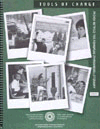Introduction for Promoters of Environmentally-Friendly Habits, Products or Services
Tools of Change provides a very accessible set of resources for promoters of environmentally-friendly habits, products or services, including a Planning Guide, specific Tools of Change, and Case Studies illustrating their use. This introduction defines what we mean by "environmentally-friendly". It also reviews the promotional challenges we face in engaging individuals to take action and, at a broader level, in achieving more sustainable economic development. Finally, it provides a site guide tailored to your interests. Choose a topic to read from the following choices.
Choose a topic to read from the following choices:
Defining "Environmentally-Friendly"
We've used the term "environmentally-friendly" to refer to those behaviors, products and services that contribute to sustainable development by minimizing disruptions to our physical environment. This term was chosen because it seems to be intuitively understood and deeply embraced by a wide range of potential users of this site.
Then what do we mean by sustainable development? According to the United Nations World Commission on Environment and Development, Sustainable development is "development that meets the needs of the present without compromising the ability of future generations to meet their own needs."
Engaging Individuals to Take Action
When asked, people often say they will pay more for green products, they will compost their organic wastes, they will walk more and drive less, and so on. And we believe they usually mean it. But when we see what products people buy, what garbage they set out for collection, and how they get from place to place - all too often we find that these same people are making other choices.
Most people would be willing to lead a life that is much more sustainable, but a wide range of obstacles get in the way. This Web site presents step-by-step guidance for minimizing these obstacles and motivating people to overcome the ones that remain. It's a source of tried and proven Tools of Change that can increase the impact of your programs and improve their financial attractiveness. It's a guide for engaging individuals to adopt more environmentally-friendly habits, products and services. And it can help you lay the foundation for more sustainable economic development in your community.
Achieving More Sustainable Economic Development
Social marketing and sustainable economic development are two approaches not traditionally linked. Over the past decade, community-based projects which use social marketing techniques to achieve sustainable development objectives have grown in number across North America. Documenting, analyzing and sharing the varied approaches used is a major first step in encouraging more widespread acceptance and use of innovative, community-led mechanisms to achieve energy and resource conservation, reduce pollution, and prevent unnecessary waste.
This site is a unique, practical resource for communities wishing to take up the challenge of promoting sustainable development at the grassroots level. It provides a wealth of information and ideas that challenge traditional molds of thinking. The Education Committee of the National Round Table on the Environment and the Economy considers it "an important addition to Canada's inventory of innovative and well-researched tools for sustainable development", and encourages community groups and decision makers to make use the site and the corresponding workbook - described immediately below.
Tools of Change: The Workbook
 The Education Committee of the National Round Table on the Environment and the Economy was mandated to increase public awareness and understanding about the principles and practices of sustainability. It therefore provided support for the publishing and distribution of a workbook version of this Web site, called Tools of Change: Proven Methods for Promoting Environmental Citizenship.
The Education Committee of the National Round Table on the Environment and the Economy was mandated to increase public awareness and understanding about the principles and practices of sustainability. It therefore provided support for the publishing and distribution of a workbook version of this Web site, called Tools of Change: Proven Methods for Promoting Environmental Citizenship.
You can find out more about this workbook or download it at www.cullbridge.com/Projects/Tools_of_Change.htm.
The Tools in Practice: Case Studies
The Case Studies section of this site brings the Planning Guide and Tools of Change to life. To search for case studies that illustrate particular points of interest, click on the "search" button at the top right of the screen.
Site Guide
Use the navigation bar at the top of the screen to explore the various sections of this site. The following are some highlights for promoters of environmental citizenship, sustainable economic development, or green products and services.
The Planning Guide:
- provides step-by-step instructions with plenty of examples, for planning and tracking your promotional programs,
- enables you to create and print out a skeleton communication plan, which can be developed over a number of Internet sessions if desired,
- places a strong emphasis on social marketing and community-based social marketing in particular, and
- stresses research-based decision-making (see the Planning Guide sections: Getting Informed and Measuring Achievements).
The Tools of Change section:
- provides step-by-step instructions with plenty of examples, for making use of specific Tools of Change,
- can help you make strategic decisions regarding marketing's traditional four P's (see This Site and Marketing - the Four P's), and
- can help you make your marketing "exchanges" more attractive by increasing the perceived benefits and decreasing the perceived costs (see This Site and Exchange Theory).
The Case Studies section:
- brings the first two sections to life, with success stories illustrating how the planning approach and the use of multiple tools led to success, and
- can be searched by topic area, location, key words, and other factors.

